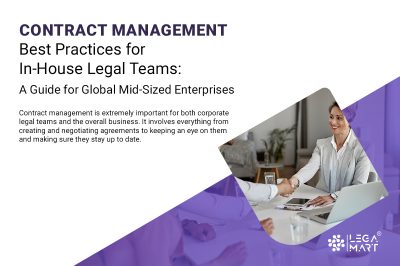Introduction
Organisations often require specialised skills and help to properly handle complex difficulties and make well-informed decisions in today’s quickly changing business landscape. Consultancy agreements are useful in this context. A consultancy agreement is a legally binding document that specifies the parameters of a business’s professional relationship with an outside consultant. These contracts are crucial to establishing a positive working relationship and outlining everyone’s responsibilities. Management consulting, technology, finance, marketing, and other sectors often use these consultancy agreements. Businesses may hire consultants to obtain unbiased insights, develop innovative ideas, carry out organisational changes, increase operational effectiveness, or meet specific project needs. Consultants provide specific expertise, skills, and experience to help businesses achieve their objectives, improve performance, and drive development.
What is a consultancy agreement?
A consultancy agreement is a contract between a consultant and a customer that sets the conditions of service. It is created when a consultant is hired to deliver services to a person or a company. This agreement protects the expectations of both parties by clarifying their interests and guaranteeing compliance. The services of consultants, organisation, and the scope of the service, along with the details of the parties, are outlined in a consultancy agreement. This agreement helps to inform customers about the consultant’s role in the organisation, the work they will do, the project’s expected duration, and the expected compensation of the consultant. As per the agreement, the consultant assists corporate organisations in evaluating and gauging their strengths and shortcomings. It allows them to examine, rethink, and advance from their position.
Types of consultants
Consultants often specialise in a certain industry sector, using each business opportunity to expand their knowledge and develop best practices. The following are the categories of consultants –
- IT consultant: Companies use IT consultants to assist them in optimising their tech support, internal networking, software, and web development. These consultants concentrate on the efficiency of your company’s production and supply chain, looking for methods to enhance storage, delivery, and response times.
- HR consultant: As a small business grows, it relies on HR consultants to guarantee that it satisfies its legal requirements as an employer while building a simple and uniform onboarding strategy.
- Financial consultants: These consultants assess corporate finances to discover strategies to reduce debt, minimise expenses, enhance revenues, and formulate investment plans for the firm’s long-term growth and financial health.
- Leadership consultants: They discover bright prospective leaders with an emphasis on collaboration and teaching CEOs to manage high-performance initiatives.
- Legal Consultants: Hiring a legal professional to advise on contracts and other legal circumstances protects your company from responsibility and gives you a technical perspective on your organisation.
Benefits of hiring a consultant
The objective analysis and viewpoint of an outsider might be invaluable when trying to enhance a certain facet of your organisation. With expertise in a Particular Field, a Consultant might offer a greater understanding of a particular problem area. As an employer, you’re obligated to provide perks like superannuation at your own expense to employees but to consultants hired, this cost is saved. Unlike permanent employees, consultants are not tied to a single company for the rest of their lives.
What are the pros and cons of a consultancy agreement?
A consultant agreement’s benefits include a clear outline of the work to be done and financial compensation. It also facilitates the other party’s compliance with quality assurance requirements. By outlining in detail what is expected of each party, a solid consultancy agreement improves the quality and timeliness of the end goods or services. There is less likelihood of litigation if the agreement includes clear terms for termination and if the consultant may work for a rival after leaving the company. Consequently, the time and money spent on lawyers by either side are reduced to a minimum should a legal claim be filed. However, this agreement does not shield either party from legal responsibility if one party breaches the agreement, leaving the other party defenceless against any losses or damages that may result. Another major disadvantage is that the agreement applies solely to projects or initiatives. A consultancy agreement is required whenever a company brings in an outside expert to provide services to its clients. The agreement safeguards the company and the consultant by outlining their responsibilities and compensation.
When a consultancy agreement is broken, what are the repercussions?
The client may take legal action against the consultant if the consultant breaches the terms of the agreement. Both monetary compensation and other forms of fair restitution for wrongdoing fall under this heading. An injunction obtained against the infringing consultant might provide some protection against further breaches of the agreement. It is possible to force performance in line with the agreement if the consultant was recruited to conduct unique tasks that no one else is competent to execute. If, on the other hand, a court decides not to order a specific execution because the services can be provided by another party or for some other reason, then the client is likely to be awarded injunctive relief and monetary damages.
What elements should a typical consultancy agreement should include(Common clauses in consultancy agreement)?

A consultancy agreement is subjective, which means it may be tailored to the interests of the parties concerned. However, some essential and significant phrases should be included in the agreement to prevent any misunderstanding about the agreement’s contents. Such terms must be included to make the agreement appealing and well-structured. The following are the key provisions of a consultancy agreement: Parties engaged are identified A consultancy agreement is formed between a person seeking consultation services and the business that offers such services. Thus, the personal information of the customer seeking consultation services and the individual or consultancy business must be provided at the outset of the agreement. Scope of Service The nature of the consultant’s services must be understood by both parties. The service and the parties’ reasonable expectations for it must be fully described in the agreement. The description of the contract includes its scope and the reason it was written. It is customary for the parties to an agreement to include a Statement of Work outlining the scope of the work to be performed under the terms of the agreement. When providing the service in instalments, it is helpful to have such supplemental paperwork. In this case, the main document containing the agreement will summarise the agreement’s scope. In contrast, the statement of work will provide detailed descriptions of all aspects of the project. Time period The agreement shall include the precise time frame for the completion of the consultation service. A timetable element in the consultancy agreement must describe the project’s deadline and the delivery of items or completion of actions in instalments. It should also include the repercussions if the consultant delays the service and the conditions under which it will be regarded as complete. Obligations and rights In the agreement, all of the rights and responsibilities of both parties must be defined. This will aid in identifying the party that has broken any contract terms and conditions during a dispute between the parties. It will improve the procedure for resolving disputes. Proprietary rights or ownership This is a critical provision in a consultant agreement. This provision should explicitly state the name of the party that will gain ownership of intellectual property developed during service. It will state whether the client or the consultant will own the property. In most circumstances, the customer retains ownership, and such finished work is called “work for hire.” Payment schedule, fees, expenditures, and compensation This provision must specify the expenditures and fees that the consultant must pay while performing their services. This provision is included so the consultant is fairly rewarded for the expenditures and fees incurred while providing the service. To avoid any misunderstandings, once the contract has been signed, the consultant must reveal such details. Model of governance A well-defined governance strategy should be in place to hold personnel responsible for the services they give to consumers. Mentioning a provision for the governance model will demonstrate the consultant firm’s professional conduct. Procedures for Escalation In consulting work, the business sector varies, and firms face various challenges. A robust escalation mechanism should be in place to prevent the negative consequences of such incidents. In the event of a speedy decision, the parties can contact the primary authority person immediately.
How do you draft a consultancy agreement (Simple consultancy agreement)?
 Step 1: Contemplate your consultancy agreement Determine your need for a consultancy contract and the purpose for which you wish to enter into a consultancy agreement. Step 2: Determine your ability to enter into a consultancy agreement Determine whether you have the legal capacity to enter into a valid contract, which involves an analysis of your jurisdiction’s laws, which helps determine whether you are legally allowed to enter into a contract. The usual considerations for determining your legal capacity are:
Step 1: Contemplate your consultancy agreement Determine your need for a consultancy contract and the purpose for which you wish to enter into a consultancy agreement. Step 2: Determine your ability to enter into a consultancy agreement Determine whether you have the legal capacity to enter into a valid contract, which involves an analysis of your jurisdiction’s laws, which helps determine whether you are legally allowed to enter into a contract. The usual considerations for determining your legal capacity are:
- Offer
- Acceptance
- Valid consideration
- Mutual assent
- Legal purpose
Step 3: Ensure that the terms and conditions to be included in the contract comply with your State laws Ensure you are familiar with state laws before incorporating your contractual terms and conditions. For instance, some states have strict laws related to liquidated damages provisions, while others don’t. Step 4: Write your Consultancy Agreement Start drafting your consultancy agreement with the basic information, such as the contract title, parties, and the services being provided. Ensure that you have adequately included the description of the parties to avoid any confusion in the future. Step 5: Describe the consideration that each party is providing The description of the consideration should include the payment amount, the payment schedule, and any other payment-related stipulations. As a consequence, disagreements over financial obligations will be avoided, and the terms of payment will be crystal obvious on both sides. Step 6: Define the consultancy services to be performed Specify the details of the consultant’s services to be performed. This must be as detailed as possible. A common way of drafting this section can be: “The client hereby agrees to engage the consultant to provide the client with the following consulting services:
- ___________
- ___________
The Services will also include any other consulting tasks which the Parties may agree on. The consultant hereby agrees to provide such services to the client.” Step 7: Include a compensation provision Mutually negotiate and decide how the consultant shall get paid for their services. Some contracts might include periodic payments or a lump sum payment at the end of the consulting procedure. A common way of drafting this section can be: “1. The consultant will charge the client a flat fee of _____ (amount) for the Services.
- The Client will be invoiced when the Services are complete.
- Invoices submitted by the consultant to the client are due within 30 days of receipt of the invoice.
- In the event that this agreement is terminated by the client prior to completion of the services but where the services have been partially performed, the consultant will be entitled to pro rata payment of the payment to the date of termination provided that there has been no breach of contract on the part of the consultant.
- The payment, as stated in this agreement, does not include any applicable taxes or duties as may be required by law. Any tax and duties required by law will be charged by the client in addition to the payment.“
Step 8: Decide whether the consultant will be an employee or an independent contractor It is important to spell out this distinction clearly in the contract itself. Most commonly, a consultant is treated as an independent contractor. As a result, if the consultant is an independent contractor, include language in the contract that waives their right to regular employee benefits such as vacation time, sick leave, health benefits, and so on, which are not available to full-time employees. “In providing the services under this agreement, it is expressly agreed that the consultant is acting as an independent contractor, not an employee. The Consultant and the Client acknowledge that this agreement does not create a partnership or joint venture between them and is exclusively a contract for service.“ Step 9: Define the length of the contractual agreement Define the term of the agreement and the date of its commencement and end. “The term of this agreement will begin on the date of this agreement and will remain in full force and effect until _______, subject to earlier termination as provided in this agreement. The term may be extended with the written consent of the parties.“ Step 10: Include the termination provision Provide clear instructions on how the agreement may be terminated. “This Agreement shall terminate without notice or action on the part of either the Company or Consultant upon the expiration of the term. Prior to the expiration of the term, either the company or the consultant may, upon written notice to the other, terminate this agreement and the consultant’s engagement hereunder for any reason or no reason. In the event of a termination by a consultant for any reason no reason or by the company other than “For Cause” prior to the expiration of the term, the company shall pay the consultant his accrued and unpaid consulting fee as of the effective date of termination and the early termination fee as per this agreement. Upon termination, no further consulting fees no other amounts shall be payable to the consultant, and the company shall have no further obligations to the consultant under this agreement.“ Step 11: Sign and execute the Consultancy Agreement Make space for the parties to sign the agreement at the end. This would result in the contract officially coming into force from the commencement date, as agreed between the parties.
Contractor vs consultant
There are differences between operating as a contractor and a consultant. The main difference is that while contractors perform their work to complete a task, consultants create solutions and guide the company through the process.
| Contractor | Consultant |
| Hired for a specific task or job. | Hired to solve a problem or to create a solution unique to the problem. |
| Experienced, but not necessarily a subject matter expert. | Assisting the host company as an advisor or subject matter expert. |
| Project-focused. | Demonstrates a sense of ownership for the role. |
| Short-term engagement. | Long-term, but it may depend on the negotiations. |
However, the roles of contractor and consultant do not necessarily have to be mutually exclusive. Considering that contractors work in the industry, by gaining experience and knowledge, they can eventually decide to switch to a consulting profession and act as an advisor for the company. If you are a consultant instead of an employee of the company, there are several implications involved:
- The consultant’s compensation is based on creating invoices rather than through the payroll. This is because the role of a consultant involves a negotiated rate of service and not a predetermined wage or salary.
- A consultant is responsible for paying their taxes, and the company is not required to pay any taxes on their behalf or provide any insurance contributions for their benefit.
- The company is not obligated to provide employee benefits to the consultant.
While there might be situations where this distinction is confusing to determine, the following factors must be taken into consideration to prevent consultants from becoming employees of your company:
- Allow consultants to maintain a sufficient amount of control over their working conditions.
- Avoid using the same consultant indefinitely without any breaks, and do not prohibit the consultant from working for others.
- Allow the consultants to use their equipment and try not to integrate their work with the employee’s.
- Regularly review their arrangement with the company and ensure that the work allotted to them remains similar to their consultancy agreement and has not changed from that provided in the employment agreement.
Latest consultany agreement in the news
The following are some of the most recent consultancy agreement signed by companies around the world: Accenture wins mega digital consultancy agreement with Saudi Aramco The Global oil and gas giant Saudi Aramco has signed deals worth $7 billion with over 100 local and international key suppliers. Among them, Accenture, which is one of the consultancy industry’s largest beneficiaries, acts as a strategic digital partner and shall play a key role in professionalising the digital foundation of Saudi Arabia and building on its digital capabilities. Technip was awarded a project management consultancy contract by Aramco Technip Energies has been selected by Aramco for a project management consultancy contract to help develop a master plan for Ras Al Khair, a new industrial city in the Eastern Province of Saudi Arabia. The city is being built to collect low-carbon investments in accordance with Saudi Arabia’s Vision 2030. EGIS India consulting Engineers Pvt. Ltd. signs capacity building project consultancy with Mongla Port Authority The Indian firm EGIS India consulting Engineers has managed to bag a contract to provide consultancy services to build a project at Mongla Port, the second-largest seaport in Bangladesh. This project is expected to help boost the sub-regional connectivity of South Asia.
Conclusion
A consultancy agreement can be a good choice for your business, especially in cases where a project requires the expertise of an experienced, professional, and external workforce. However, employers need to ensure that the role of consultants is distinguished from that of other players in the organisation to avoid any trouble in the future. If you are considering hiring a consultant or want to acquire more information on consultancy laws and procedures within your jurisdiction, refer to the services of our experienced lawyers. LegaMart is always there to assist you and solve all your legal troubles.





